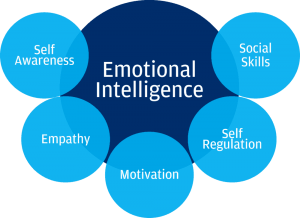Improving emotional intelligence involves developing a better understanding and control of your own emotions, as well as being able to empathize with others.
Successful leaders often have high emotional intelligence. The five major components of EQ are self-awareness, self-regulation, social awareness, social regulation and motivation. These traits help with making decisions, setting goals and managing stress, which are all key elements of leadership. Although some leaders are naturally gifted with high EQ, it is something that can be improved. As a leader do you have a clear understanding of what is emotional intelligence and how to improve your EQ?
The term “emotional intelligence” was first unveiled in a paper written by Peter Salovey and John D. Mayer. According to the Yale Center for Emotional Intelligence, Salovey and Mayer developed the theory while painting a house.
Here are some tips to enhance your emotional intelligence:
Self-awareness:
- Pay attention to your emotions without judgment. Recognize and label them.
- Reflect on your emotional responses to various situations and understand the triggers.
Self-regulation:
- Practice mindfulness and meditation to manage stress and control impulsive reactions.
- Develop healthy coping mechanisms for dealing with challenging emotions, such as taking deep breaths or stepping away from a situation temporarily.
Motivation:
- Set realistic and achievable goals for yourself.
- Find intrinsic motivation by connecting your goals to your values and passions.
Empathy:
- Actively listen to others without judgment, and try to understand their perspective.
- Put yourself in others’ shoes to better grasp their feelings and experiences.
Social skills:
- Develop effective communication skills, both verbal and non-verbal.
- Build and maintain positive relationships by being supportive, understanding, and cooperative.
Learn to handle criticism:
- View criticism as constructive feedback rather than a personal attack.
- Use criticism as an opportunity for growth and improvement.
Cultivate a growth mindset:
- Embrace challenges as opportunities for learning and development.
- View setbacks as temporary and learn from them.
Practice emotional detachment:
- While it’s important to be empathetic, it’s also crucial to maintain a degree of emotional detachment to avoid being overwhelmed by others’ emotions.
Develop resilience:
- Learn to bounce back from failures and setbacks.
- Focus on solutions and opportunities rather than dwelling on problems.
Continuous learning:
- Stay open to learning about emotions, interpersonal dynamics, and communication.
- Seek feedback from others to gain insights into how you can improve your emotional intelligence.


